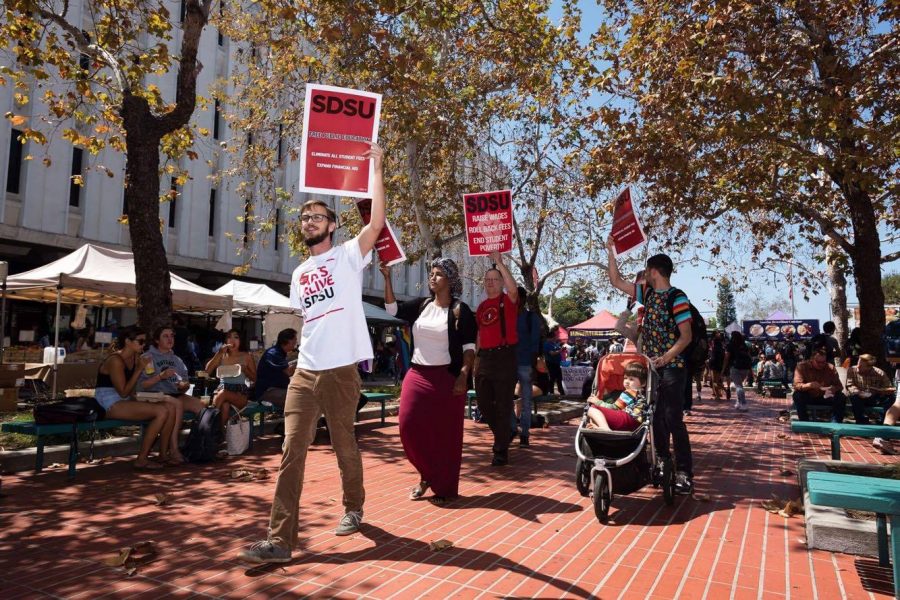San Diego State graduate student union members voted unanimously on Oct. 10 to reject a recent contract offer from the California State University system that would give teaching and grading assistants a three percent general salary and three percent wage increase.
Members now say they have encountered pushback from leadership of the UAW Local 4123, which represents CSU academic student employees, and who graduate students say want the contract approved.
The offer for the 2016-17 academic year would also increase the minimum wage for instructional student assistants to $12.50, and ISAs earning more than the minimum wage will receive a $0.25 across-the-board salary increase.
For the 2017-18 academic year, TAs and GAs would receive another general salary increase of two percent and another three percent range adjustment increase. Pay for ISAs would be increased again by $0.50 for those making the minimum wage, and $0.25 for those making more than the minimum wage.
Since SDSU is just one of 23 CSU campuses, SDSU graduate students’ rejection of the contract offer does not necessarily mean CSU graduate students as a whole will reject the offer.
UAW Local 4123 President Sandip Roy said voting at some CSU campuses was conducted at membership meetings last week, and voting will continue into this week at the remaining campuses.
“We are a single unit and do not report out vote counts by campus,” Roy said. “The Bargaining Team voted unanimously to recommend the ratification of the contract.
“Two of the members of team, who were duly elected, come from SDSU.”
Of the 18 members who showed up to vote on Oct. 10, all voted against ratification of the new contract, said graduate student Bo Elder.
“I wouldn’t want to claim to speak for everyone, but in general, there was a feeling that it didn’t represent a significant improvement,” said Elder. “It wasn’t anywhere near what we were asking for, and it is still a poverty wage.”
Elder said he was also concerned that union president Roy was trying to influence members to vote yes on the contract.
He said no one should be forced to tell people how they should vote.
“I think it’s extremely important that our mutual aid organizations, like unions, have to be democratic and have to guarantee their members the right to speak their opinion,” Elder said. “Their value is very limited if people aren’t able to participate.”
He said a union organizer at CSU Northridge was fired over this.
“Many of us feel that this was an unjustified firing,” Elder said. “We think that this person was actually doing a great job and the reason that they were released from their position was that they were not toeing the line of the president of the union.”
The organizer who was fired, Jen McClellan, a graduate student at CSU Northridge, said in an interview she has only been an organizer at CSUN since the beginning of the fall 2016 semester.
She said she was first told to canvas buildings on campus and randomly look for graduate student workers to sign up for the union.
However, she felt this was inefficient, and so looked for better ways to sign up new members.
“I asked for a list of all the members and non-members, potential members, on-campus, which I understand Sandip had, but I never actually got that from him,” McClellan said, referring to the union president.
She said she instead began going to graduate student orientations and signing up groups of people, taking down their email addresses.
“I was starting to build a list of groups so that I could hold monthly meetings on campus and make sure everyone who wanted to be involved in their union could be.”
McClellan said Roy told her to stop organizing in this manner when he found out about it.
“Sandip told me that if I wanted to send out emails, I should send him what I wanted to send out and he would send it to my membership,” McClellan said. “Basically, he wanted to keep control centralized.”
She also said she was not given very much information about contract proposals and the bargaining process from Roy.
“When it came to the ratification, I didn’t even know that my membership had the choice to vote yes or no because all Sandip told me was that it was my duty to tell them that ‘this is the offer CSU gave us’ and just hold a membership meeting so that people can come out and ratify the contract,” she said.
“After talking to Bo in San Diego, I learned that they were campaigning for a ‘no’ vote, at which point, I realized my members should also have the ability to know what a ‘yes’ vote and what a ‘no’ vote means, and decide for themselves.”
McClellan said Roy fired her on Monday, Oct. 10, the day of CSUN’s membership meeting, after she voted no on the contract.
“I asked him on what grounds he was firing me and he didn’t tell me,” McClellan said. “And I still haven’t received an explanation.”
In response to these allegations, Roy said personnel actions in general are not a matter for public discussion.









